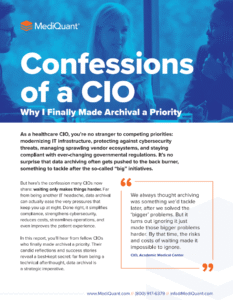EHR Data Transfer – 6 Steps to Successfully Move Data to a New EHR
1. Analyze Old EHR Data
2. Plan the Data Transfer
3. Minimize Downtime
4. Move the Data
Choose the most suitable format for your data transfer. If the old system can export data in HL7 or Continuity of Care Record format, you may use those to move the data.
Otherwise, you need to transfer the data from the old database in field and record format.
Before transferring data from the old EHR to the new one, ensure that you do field mapping. This process enables you to confirm that the correct data comes into the new system’s data fields.
Then using the appropriate tools, extract, transform, and load the data from the legacy database into a staging database. Some of the data may not fit perfectly into the new database, and such data must still be transferred, although it may be held in an unstructured format.
5. Test the Data
6. Go Live
Want to have an expert migrate or extract data for you?
Contact MediQuant at 844.286.8683 to see a free demo of our data extraction tool and process. You can also reach us through our contact page to discuss all your data archiving and migration needs.
More Thought Leadership
EMR Data Migration Best Practices
EHR data migration is a complex task for most healthcare organizations. Successful migration projects require planning, data and scope analysis, data standardization, and quality assurance. On the other hand, migrating medical data incorrectly has grave consequences....
Cache DB Migration: A Guide to Successful Data Conversion
This brief guide on Cache DB migration will help providers move data stored in a local Cache database to the cloud. Cache is a unique database server. It can store a database in relational and object format while providing multidimensional data access. This database...
VSAM Extraction: 5 Steps to Extract Data from VSAM to Oracle DB
Virtual storage access method (VSAM) files are used in many legacy systems. These files exist on virtually all mainframe computers. A VSAM extraction project may be required in healthcare organizations with patient records stored in these systems. In many cases, the...
Contact Us Today







